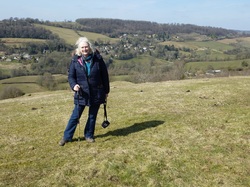 On Swifts Hill, opposite Slad (more photos below)
On Swifts Hill, opposite Slad (more photos below) Everyone round here has a Laurie Lee story...do you have one to add?
I first fell in love with Laurie Lee’s poetry when I was still at school. It carried the sensuous qualities of nature along with a strong dash of romance, the two elements which were closest to my heart at the time. I still have the edition of ‘Pocket Poets’, marked to indicate my favourite verses, for instance:
When red-haired girls scamper like roses over the rain-green grass,
and the sun drips honey.
('Day of these Days')
It seemed to me that he understood the magnetic pull of the English landscape, something I felt intensely from early years, and which perhaps has kept me here ever since. Even though I have had the travel bug, England is home, and I’ve always felt that I can’t give up the bluebells and the dew on the grass and the village fetes on a hot summer’s afternoon. In those days, I hadn’t travelled much, mostly by boat and train which was the norm then, but when Laurie Lee wrote about coming home across the Channel, I recognised what he was talking about. In the poem 'Home from Abroad', he says that Kent is merely a ‘gawky girl’, a pale shadow of the sultry wonders he has discovered abroad. But within a short time, her presence is transformed into ‘the green-haired queen of love’ whose ‘rolling tidal landscape’ drowns foreign memories in ‘a dusky stream’. The subtler charms of England have lured him back again.
Now we live near Laurie’s old stomping ground, the Slad Valley in Gloucestershire, barely fifteen minutes’ drive from the place he wrote about in such a compelling way in Cider with Rosie and in his poetry. And it often seems that he’s not quite gone from there. We are relative newcomers to the area, but practically everyone who’s been around Stroud for longer has a tale to tell about him. Just recently we watched the play of Cider with Rosie at the Everyman Theatre, Cheltenham. Two well-dressed middle-aged ladies in the row behind us were discussing him:
‘So did you see Laurie Lee often, then?’
‘Oh yes! I used to meet him about twice a week, at the Imperial.’
Hmm.
My acupuncturist mentioned casually that he was once her landlord, a musician friend related how he used to perform with him, and a local, now well-established writer, revealed that she’d marched up to his front door when she was still a teenager, asking if she needed to go to university in order to become a writer. ‘You don’t need all that,’ he told her, and it seems he was right.
So, as one who is always late to the party (metaphorically speaking), I never met Laurie Lee, but I can still revel in the legacy he left and the landscape he inhabited. Yesterday, in brilliant sunshine, we walked up Swift’s Hill which lies on the other side of the steep Slad Valley. Ponies were basking in the sun, a buzzard or two soared overhead, and the primroses were out in the hedgerows. We looked across to Slad, picking out the phone box, the pub, and the cottage we thought Laurie had lived in. (Rose Cottage, at the end of his life; the cottage from 'Cider with Rosie' is still there too.) There was curling woodsmoke in the air – ‘having a bonnie’ as the garden owner told us later - which added a touch of the old-world to the panorama. As we continued our walk, tracing the contours of the valley, we admired the charming, steep-gabled grey stone houses that were sprinkled across the hillside, ranging from tiny cottages like something out of a nursery rhyme to grander dwellings with many eaves. This local Gloucestershire architecture is my favourite of allEnglish styles; no two houses seem alike, and their quirky individuality seems to be a feature of people who live in the area, too.
Back in Slad later, we paid a visit to the Woolsack pub, Laurie's old watering hole, taking a look at the Laurie Lee bar, but hoping we wouldn’t get mistaken for tourists. Which in one way we were, of course – but maybe we were more pilgrims for an afternoon, on the L.L. trail. We found his tombstone in the churchyard, and later I looked up his poem ‘The Wild Trees’, which begins with the following lines:
O the wild trees of my home,
forests of blue dividing the pink moon,
the iron blue of those ancient branches
with their berries of vermilion stars
and ends: Let me return at last….
to sleep with the coiled fern leaves
in your heart’s live stone
Interviews with Laurie Lee can be downloaded at: http://www.bbc.co.uk/gloucestershire/focus/2003/07/laurielee1.shtml
An album of Johnny Coppin with Laurie Lee, 'Edge of Day' (1989) can be purchased via http://www.johnnycoppin.co.uk
I first fell in love with Laurie Lee’s poetry when I was still at school. It carried the sensuous qualities of nature along with a strong dash of romance, the two elements which were closest to my heart at the time. I still have the edition of ‘Pocket Poets’, marked to indicate my favourite verses, for instance:
When red-haired girls scamper like roses over the rain-green grass,
and the sun drips honey.
('Day of these Days')
It seemed to me that he understood the magnetic pull of the English landscape, something I felt intensely from early years, and which perhaps has kept me here ever since. Even though I have had the travel bug, England is home, and I’ve always felt that I can’t give up the bluebells and the dew on the grass and the village fetes on a hot summer’s afternoon. In those days, I hadn’t travelled much, mostly by boat and train which was the norm then, but when Laurie Lee wrote about coming home across the Channel, I recognised what he was talking about. In the poem 'Home from Abroad', he says that Kent is merely a ‘gawky girl’, a pale shadow of the sultry wonders he has discovered abroad. But within a short time, her presence is transformed into ‘the green-haired queen of love’ whose ‘rolling tidal landscape’ drowns foreign memories in ‘a dusky stream’. The subtler charms of England have lured him back again.
Now we live near Laurie’s old stomping ground, the Slad Valley in Gloucestershire, barely fifteen minutes’ drive from the place he wrote about in such a compelling way in Cider with Rosie and in his poetry. And it often seems that he’s not quite gone from there. We are relative newcomers to the area, but practically everyone who’s been around Stroud for longer has a tale to tell about him. Just recently we watched the play of Cider with Rosie at the Everyman Theatre, Cheltenham. Two well-dressed middle-aged ladies in the row behind us were discussing him:
‘So did you see Laurie Lee often, then?’
‘Oh yes! I used to meet him about twice a week, at the Imperial.’
Hmm.
My acupuncturist mentioned casually that he was once her landlord, a musician friend related how he used to perform with him, and a local, now well-established writer, revealed that she’d marched up to his front door when she was still a teenager, asking if she needed to go to university in order to become a writer. ‘You don’t need all that,’ he told her, and it seems he was right.
So, as one who is always late to the party (metaphorically speaking), I never met Laurie Lee, but I can still revel in the legacy he left and the landscape he inhabited. Yesterday, in brilliant sunshine, we walked up Swift’s Hill which lies on the other side of the steep Slad Valley. Ponies were basking in the sun, a buzzard or two soared overhead, and the primroses were out in the hedgerows. We looked across to Slad, picking out the phone box, the pub, and the cottage we thought Laurie had lived in. (Rose Cottage, at the end of his life; the cottage from 'Cider with Rosie' is still there too.) There was curling woodsmoke in the air – ‘having a bonnie’ as the garden owner told us later - which added a touch of the old-world to the panorama. As we continued our walk, tracing the contours of the valley, we admired the charming, steep-gabled grey stone houses that were sprinkled across the hillside, ranging from tiny cottages like something out of a nursery rhyme to grander dwellings with many eaves. This local Gloucestershire architecture is my favourite of allEnglish styles; no two houses seem alike, and their quirky individuality seems to be a feature of people who live in the area, too.
Back in Slad later, we paid a visit to the Woolsack pub, Laurie's old watering hole, taking a look at the Laurie Lee bar, but hoping we wouldn’t get mistaken for tourists. Which in one way we were, of course – but maybe we were more pilgrims for an afternoon, on the L.L. trail. We found his tombstone in the churchyard, and later I looked up his poem ‘The Wild Trees’, which begins with the following lines:
O the wild trees of my home,
forests of blue dividing the pink moon,
the iron blue of those ancient branches
with their berries of vermilion stars
and ends: Let me return at last….
to sleep with the coiled fern leaves
in your heart’s live stone
Interviews with Laurie Lee can be downloaded at: http://www.bbc.co.uk/gloucestershire/focus/2003/07/laurielee1.shtml
An album of Johnny Coppin with Laurie Lee, 'Edge of Day' (1989) can be purchased via http://www.johnnycoppin.co.uk
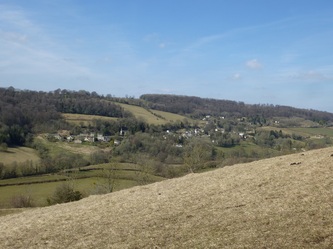
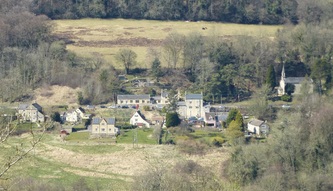
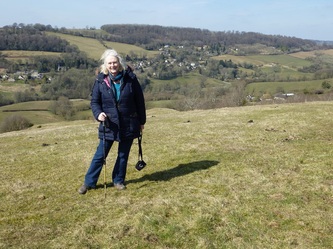
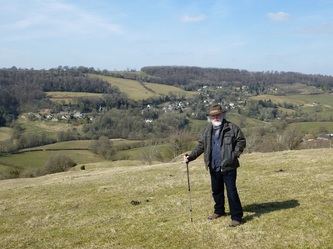
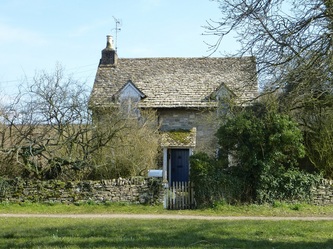
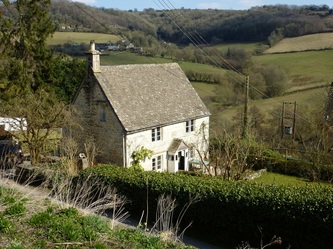
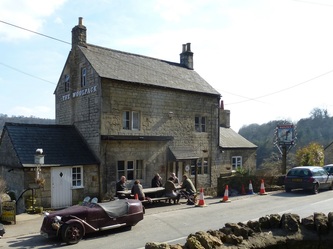
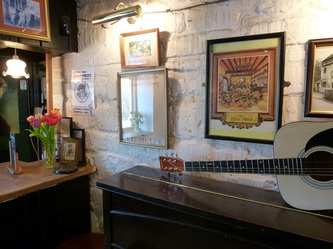
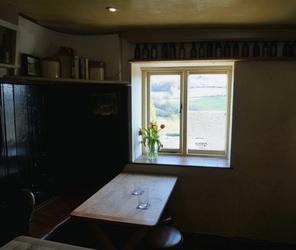
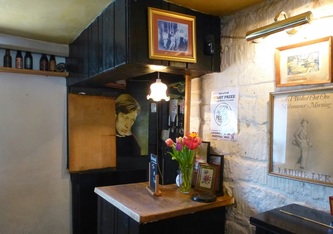
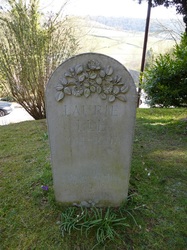
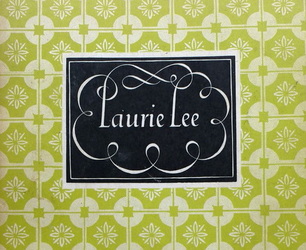
 RSS Feed
RSS Feed